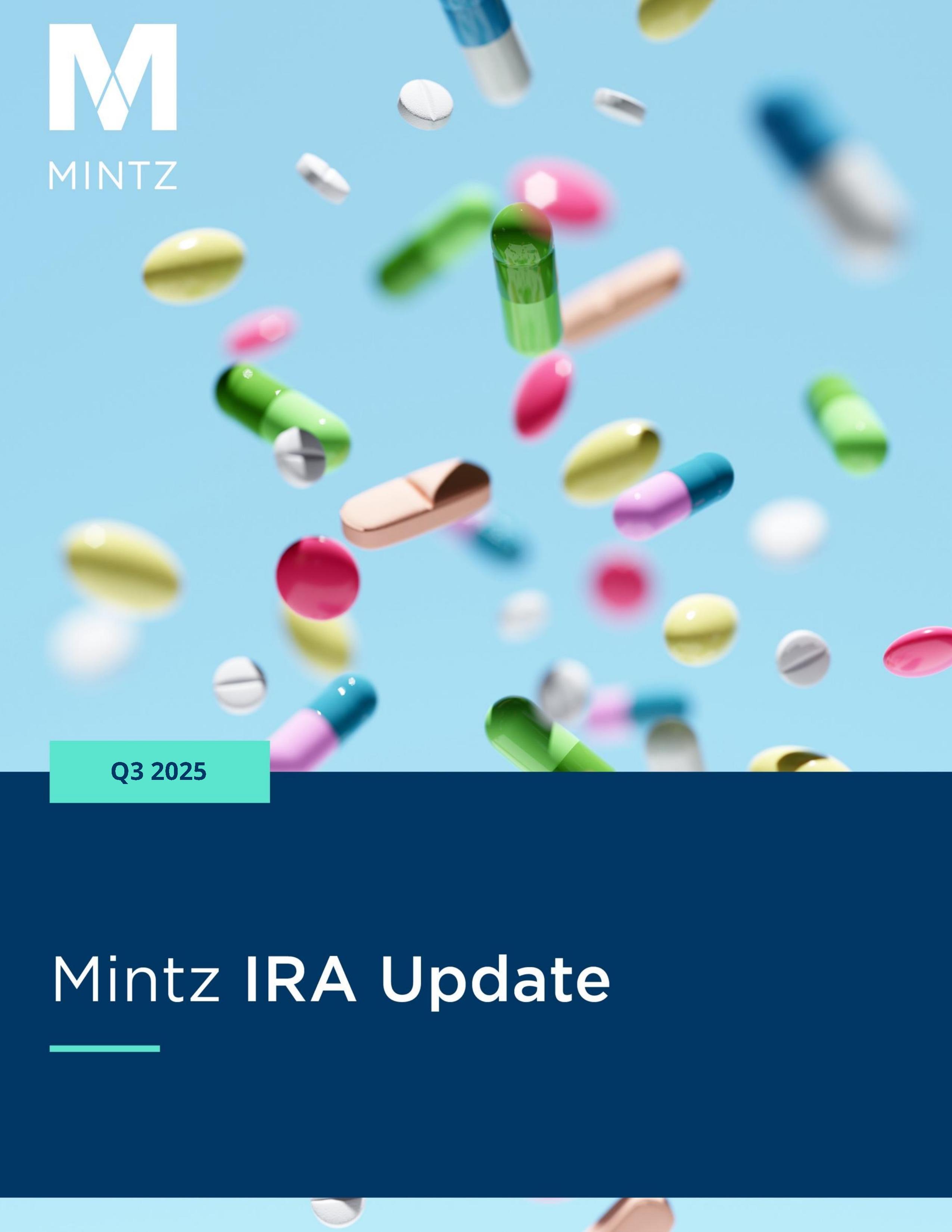
Mintz’s Managed Care, PBMs & Pharmacies Practice is pleased to present the ‘Fifth Edition: Q3 2025’ of our Mintz IRA Update, a regular publication that delves into developments of the Inflation Reduction Act of 2022 (IRA) and their impact on pharmaceutical supply chain stakeholders. To help our clients track and stay up to date with the developments related to the IRA, the Mintz IRA Update provides informed and insightful analyses on the issues that directly affect your business. We also note that given the IRA’s importance, we offer clients personalized, one-on-one information sessions regarding the short- and long-term impacts of the IRA. If you are interested, please contact Theresa Carnegie, Tara Dwyer, Rachel Alexander, or Lauren Moldawer for more information (contact details included further below). We hope you find the Mintz IRA Update to be a useful resource. If you have any recommendations on additional content that would be helpful to see in future editions, please do not hesitate to reach out to our team to let us know. We hope you enjoy, and please subscribe to receive future editions! — Theresa C. Carnegie, Tara E. Dwyer, Rachel A. Alexander, & Lauren M. Moldawer |  |
Podcast Companion Piece
For a quick listen of the top hits in the report, be sure to check out our 5-minute podcast here.
In this edition of the Mintz IRA Update
IRA Medicare Drug Price Negotiation Program Updates for Q3 2025 | Still Undefeated: Government Notches Three More Victories in Negotiation Program Lawsuits | Redesigning Part D for CY 2026 |
Under Pressure: The Trump Administration’s Drug Pricing Executive Orders | 340B Roundup | PhRMA’s 2025 Policy Agenda and the Industry’s Crossroads with the IRA and Drug Pricing Reform |
IRA Medicare Drug Price Negotiation Program Updates for Q3 2025
A discussion of key takeaways from CMS’s most recent draft guidance for the third cycle of the Negotiation Program and how recent legislative efforts may curb the rollout and effects of the Negotiation Program.
Still Undefeated: Government Notches Three More Victories in Negotiation Program Lawsuits
A comprehensive update on the government’s continued success in defending the Negotiation Program, highlighting recent court rulings that have largely favored the government’s position emphasizing the voluntary nature of Medicare participation.
Redesigning Part D for CY 2026
A breakdown of CMS’s recently finalized CY 2026 Part D Redesign Program Instructions, which build upon the IRA’s reforms to Part D in an effort to improve affordability and clarify coverage standards.
Under Pressure: The Trump Administration’s Drug Pricing Executive Orders
A review of recent unilateral actions taken by the Trump administration to address prescription drug costs, including two Executive Orders and direct outreach to pharmaceutical manufacturers.
340B Roundup
Since our last 340B update, there has been significant action in the 340B space. Read about the latest in the 340B space:
- States and Manufacturers Continue to Battle over 340B Contract Pharmacies. As manufacturers seek to regulate 340B contract pharmacies, states have responded by enacting laws that ensure contract pharmacy access, which manufacturers in turn have challenged. These challenges have placed pressure on state governments, but have often faltered in federal court.
- HRSA Launches 340B Rebate Model Pilot Program Amid Ongoing Legal and Regulatory Shifts. Among the various recent federal agency proposals related to 340B, the Health Resources and Services Administration (HRSA) released a highly anticipated 340B Rebate Model Pilot Program proposal.
- CMS Proposes Steeper OPPS Clawbacks, Launches Drug Cost Survey with Public Comment. CMS proposes payment cuts to all hospitals under the Medicare Outpatient Prospective Payment System (OPPS) and a survey of hospital drug acquisition costs, laying the groundwork for a future reduction in Medicare drug payments to 340B hospitals.
- Senate HELP Committee’s Long-Awaited 340B Report Highlights Ongoing Problems but Provides Few Solutions. Finally, the Senate Health, Education, Labor, and Pensions (HELP) Committee released the results of a 340B Program investigation.
PhRMA’s 2025 Policy Agenda and the Industry’s Crossroads with the IRA and Drug Pricing Reform
PhRMA’s 2025 policy agenda outlines a strategic response to evolving US drug pricing reforms, emphasizing the protection of pharmaceutical innovation while advocating for regulatory changes across pricing, supply chain oversight, and access programs. The agenda reflects growing industry tensions with federal and state initiatives, particularly those introduced under the Inflation Reduction Act and related executive actions.
Disrupting the Pharmaceutical Supply Chain: The Era of the DTC Model
President Trump’s Executive Order on most-favored-nation drug pricing has accelerated pharmaceutical manufacturers’ adoption of direct-to-consumer (DTC) drug delivery models. This article examines emerging partnerships with telehealth platforms, regulatory scrutiny around fraud and advertising, and the potential disruptions this model poses for traditional drug distribution.
Medicare Part B Physician Fee Schedule Guidance and Its Potential Implications for Medicare Part D
This discussion of CMS’s CY 2026 Physician Fee Schedule Proposed Rule focuses on its new requirements for evaluating and reporting Bona Fide Service Fees in Medicare Part B, with potential implications for Part D.
The Uncertain State of Affairs for GLP-1s
A discussion of how GLP-1 drugs are transforming obesity treatment while raising urgent questions about affordability, access, regulatory scrutiny, and the long-term role of public policy in shaping their impact on the US health care system.
Authors
Rachel A. Alexander
Member
Theresa C. Carnegie
Member
Tara E. Dwyer
Member
Lauren M. Moldawer
Member
Stephnie A. John
Associate
Hassan Shaikh
Associate
Mitchell J. Clough
Associate
Xavier G. Hardy
Associate
Samantha Hawkins
Associate
Abdie Santiago
Associate
Rachel E. Yount
Of Counsel












